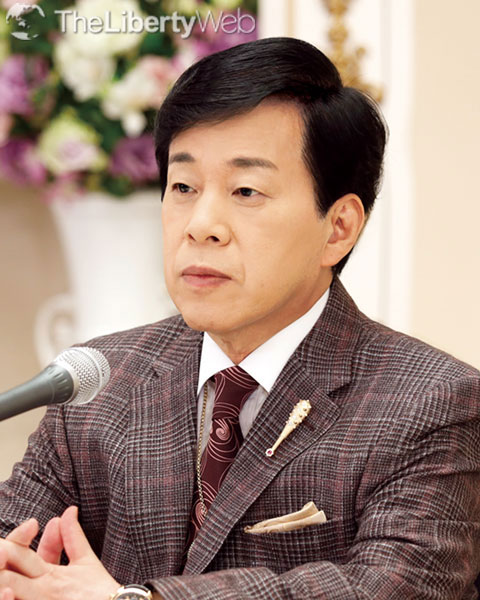The Role of a Business Leader During a Recession
World Teacher’s Message No.310
Photo:PIXTA
I’m planning on taking over my father’s construction business as a second-generation executive. I understand we’re living in tough times. How should I grow our business as a top executive?
Lecture: “Attaining Absolute Happiness” (Q&A section)
December 13, 2009 – Happy Science Tottori Temple

Master Ryuho Okawa: As you’ve said, the construction industry is facing a very tough situation with our current administration [at the time of the lecture]. You’re certainly right in that nowadays the industry has to consider external factors and I suppose it is somewhat difficult to navigate this.
Well, in the world we live in, our economic principle is also a “pendulum principle,” which is to say that when things go to one extreme, they will always swing to the opposite end. Our world is designed to maintain a balance. Difficult times will not last forever.
If you can train your “muscles” during a difficult period and find ways to live through it, then the next time the wind blows in your favor, you’ll be able to grow your organization and your business.
You mentioned you are taking over your father’s business as a “second generation.” That is truly a blessing.
[Happy Science] is working to develop entrepreneurs ourselves, but nowadays, objectively speaking, it is rather difficult for an entrepreneur to start a new business and succeed. It’s really difficult.
I can’t state exact figures, but I suppose almost 90% of new businesses fail within three years. In this day and age, 90% of new ventures will fail within three years. It’s said that only one out of 100 new ventures will stay in business for 10 years. This is the time we live in. It’s that competitive: if you start a new business, only one out of 100 businesses will survive for 10 years. 10 out of 100 new ventures may last for three years, but if you look at the span of 10 years, the surviving venture goes down to one. This is what people say.
Going back to your point on being a second-generation executive, you are fortunate. Your business already has a foundation that was built by your predecessors, so compared to someone starting a new venture, you already have many things – a certain level of business framework, its content, methods, human capital, and various other things. That’s why you’re at an advantage. Even if the business environment is not favorable, you’re in a much, much better position than those who are just at a starting point, and for that, you must first feel grateful.
Then, once you’ve given your gratitude, you must build up the wisdom to survive in a difficult time like this.

Business Leaders Must Fight With an Attitude of Bearing Full Responsibility Alone
Now, how do you live through difficult times with gratitude? In terms of work, the most important thing, in a time like this when the recession may be here to stay, is for business leaders to fight with an attitude of bearing full responsibility themselves.
Think of it like this: “The CEO is fully responsible”; “The CEO alone is responsible for business performance.” This is an important mental attitude in times like this. The top executive himself, herself, must take the initiative and fight for the company in all areas from product development, sales, to customer service.
For a business time to survive in times of crisis, the top executive must take the initiative and fight at the front line. This should be the attitude of a top executive to overcome a challenging period of economic recession. Then, other employees will follow suit. In a time like this, you can’t just tell your employees, “Work hard, everyone,” and not take action yourself. That won’t cut it.
What Will Your Business Look Like In 10 Years?
Another thing you should be doing in a recessionary period is learning. Study during a period of recession. Think ahead, and study material that will be beneficial for your future business.
Simply put, you must study in order to accumulate the “source of income” for your business in future years.
You need to put in your full effort for your business today, but at the same time, you must think about how you need your business to look like five, ten years later, how it should be in the future. Consider how your business framework, methods of work, the business, will look like five, ten years later. You need to build weapons that you will need later.
In order to do that, what do you need? First is “knowledge.” It’s crucial to prepare knowledge and have it by your side. I want to say this.
The next point depends on the size of your business. I can’t say for every company because each company is scaled differently. But, the next point is to “buff up” your organization. During a recession, it’s easy to make a clear distinction between those who are truly capable and those who aren’t. When the economy is booming and anyone can succeed, you must treat your employees equally, but a recessionary period calls for a drastic cut. Is this person holding your company back? Or are they contributing to your team? Is this person extremely capable, or is he or she not? You’re sitting on a gold mine and wasting human capital if you are not using talented employees out of seniority or because that’s the way you’ve always done it.
In times of recession, be bold and give those talented employees greater authority to do their job. You need to ask general managers and department chiefs who aren’t meeting up to their roles to step aside, even if you feel bad. Promote exceptional talent, and position them in fitting roles. This is an opportunity to reform your organization into a merit-based, “lean” organization.
So, a recession is your chance to do research for your future business projects, and it’s also an opportunity for structural reform so your company becomes lean. I can say this.
With that said, we need to revisit our first point: the executive at the top must take action themselves. The time calls for this. The CEO must become the leading salesman, visiting customers and listening to the needs of customers. Please think about this. If so, you will be able to get through this period and it will all turn in your favor.

Photo:PIXTA
A Recession Is Your Time to Invest
Now, there’s one thing that should not be mistaken. It’s natural that you’d become frugal when a recession hits in anticipation of lower income. But, it is during this time when an increasing number of business leaders cannot distinguish between “consumption,” or “an expense,” and an “investment.”
Is it simply an expense or consumption? Or is it an investment? You must distinguish between these very carefully.
Even if we are in a recession, you must make investments; rather, a recessionary period is the time to invest. If you invest during a recession, your investments will come alive and bear fruit once the economy recovers. The projects your company invested in during a recession will eventually grow.
If you only shrink up and tighten your spending during a recessionary period, once the economy booms, now you will be the one to go down. A recessionary period is actually an opportunity to invest in new infrastructure, product development, land purchases, construction of factories, and so on. You must invest during a recession. This is also the time to spend money.
From an accounting standpoint, the first thing they all say during a recession is, “Cut, cut, and cut.” The administration [at the time] has already begun to “cut, cut, and cut” the budget in the name of reclassification, but if you do that, a chain of corporate bankruptcies is bound to follow. Businesses will go bankrupt one after another. The recession will worsen. Then, tax revenues will fall. Even today, more than 70% of companies are in the red, so many will go bankrupt. Lots of businesses will go under. The construction industry and general contractors will be one of the first ones to take a big blow.
The Happiness Realization Party (HRP), our political party, is totally opposite. Whether it be general contractors or the aircraft industry, we are determined to save those companies. We [the HRP] have a philosophy that fully supports any projects that will lead to a brighter future. Mr. Hatoyama [the prime minister at the time] has a spirit of “people over concrete” and claims people are more important than concrete, but that is a shortsighted, overly simplistic view.
This is what I’m saying. If we build a school in Nasu, the building, and the concrete it’s made out of, is important. From the school building to the dormitory, cafeteria, gymnasium and a swimming pool, concrete is important. A sturdy building can survive through the cold winters of Nasu, and children can live safely and learn in a comfortable environment. Now, it would be a disaster if we ignored concrete and decided to build a school using tin or prefab. It can cost human lives. This is why I cannot think so simply.
Eventually, Our World Will Unfold According to True Ability
Whatever it is, I believe in advocating for things that will be constructive of our future, things that we will need in the future, and push forth in that direction. That’s generally how I view everything. And that’s how I want to guide public policy. I want our country to achieve a “golden resurrection” once again, and work to let it not sink into the abyss.
Please, I ask that you gather your grit and endure for a while. Our world will surely unfold based on true ability. You may face a harsh environment and get poor results, but if you do, consider yourself still far from perfect and devote yourself to work hard. Let’s do our best.



















